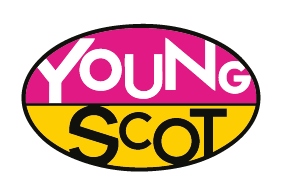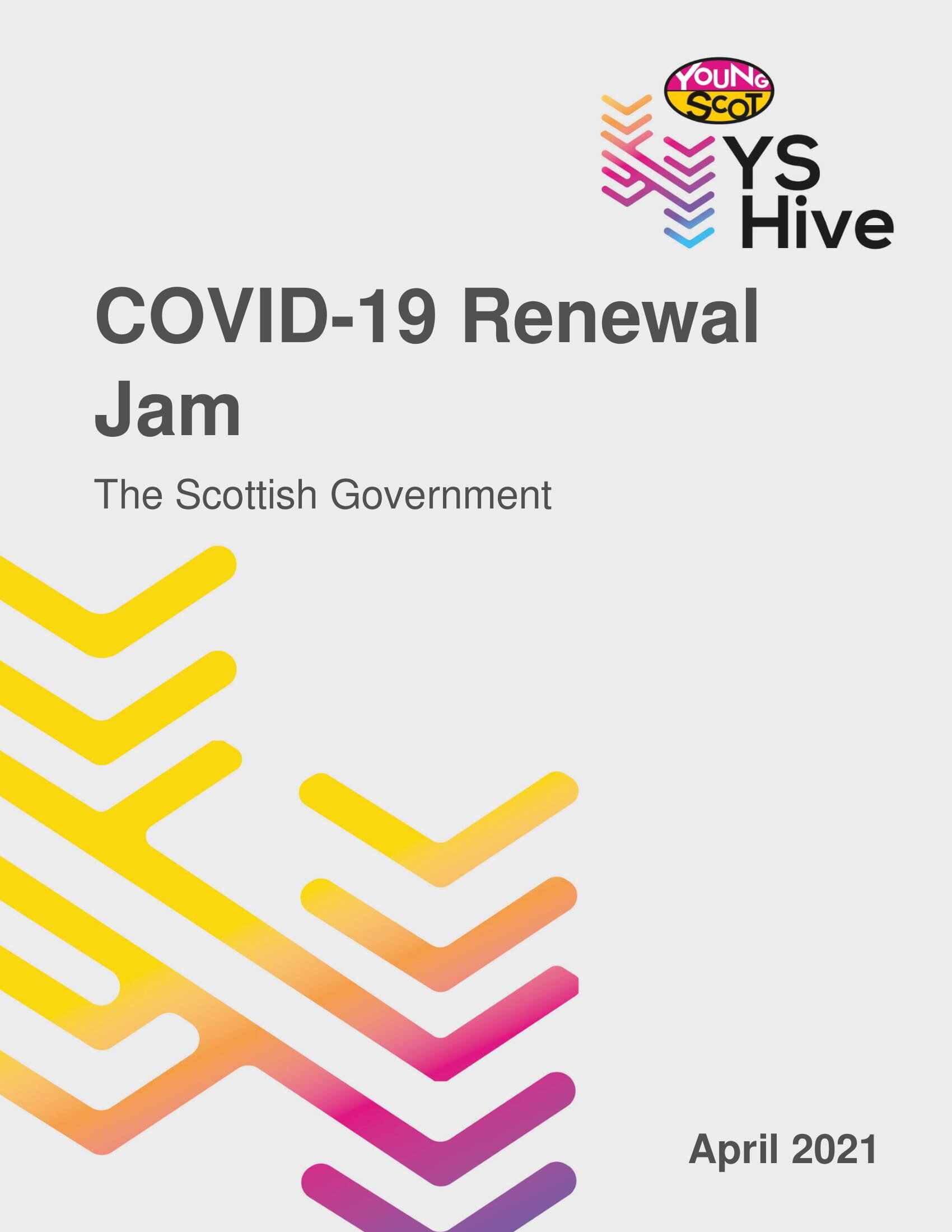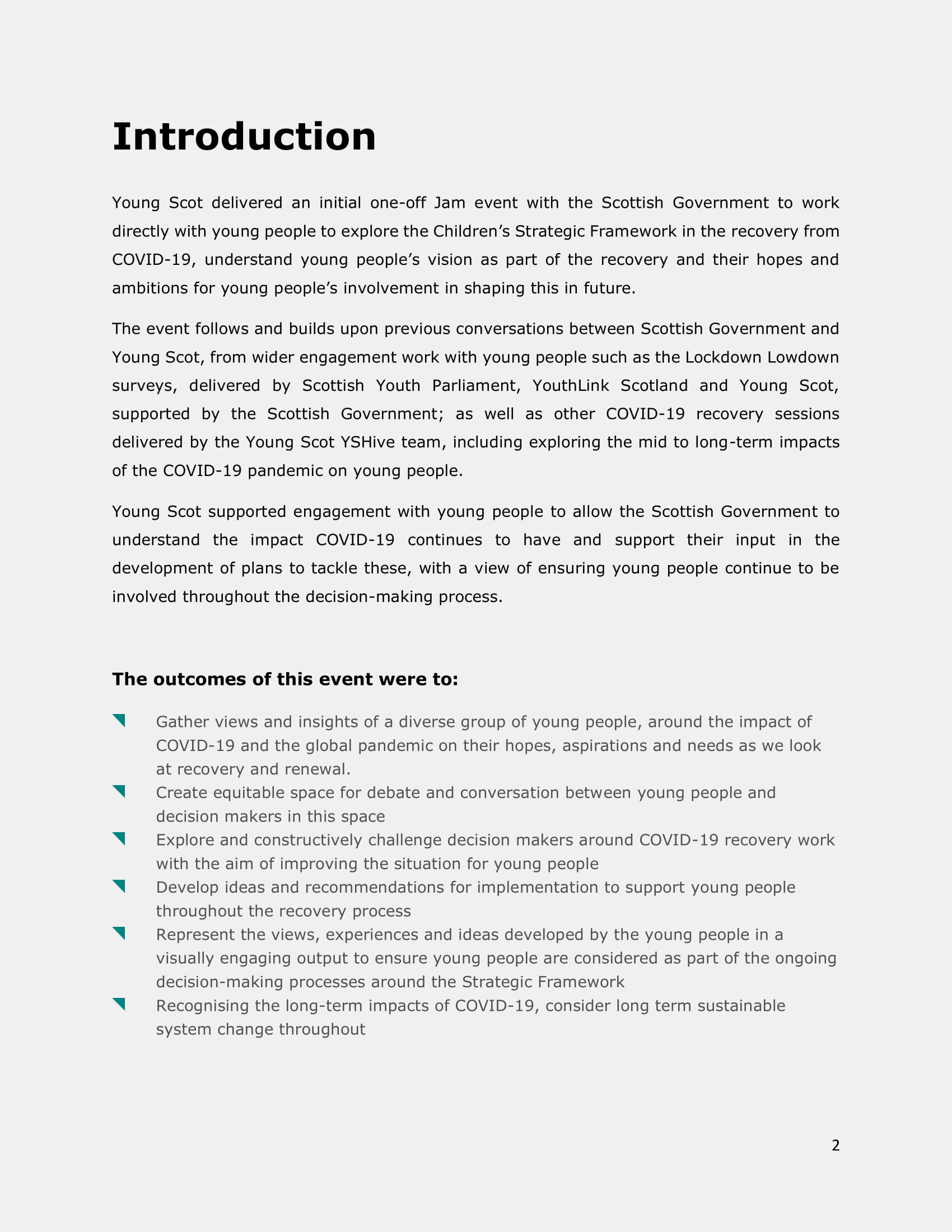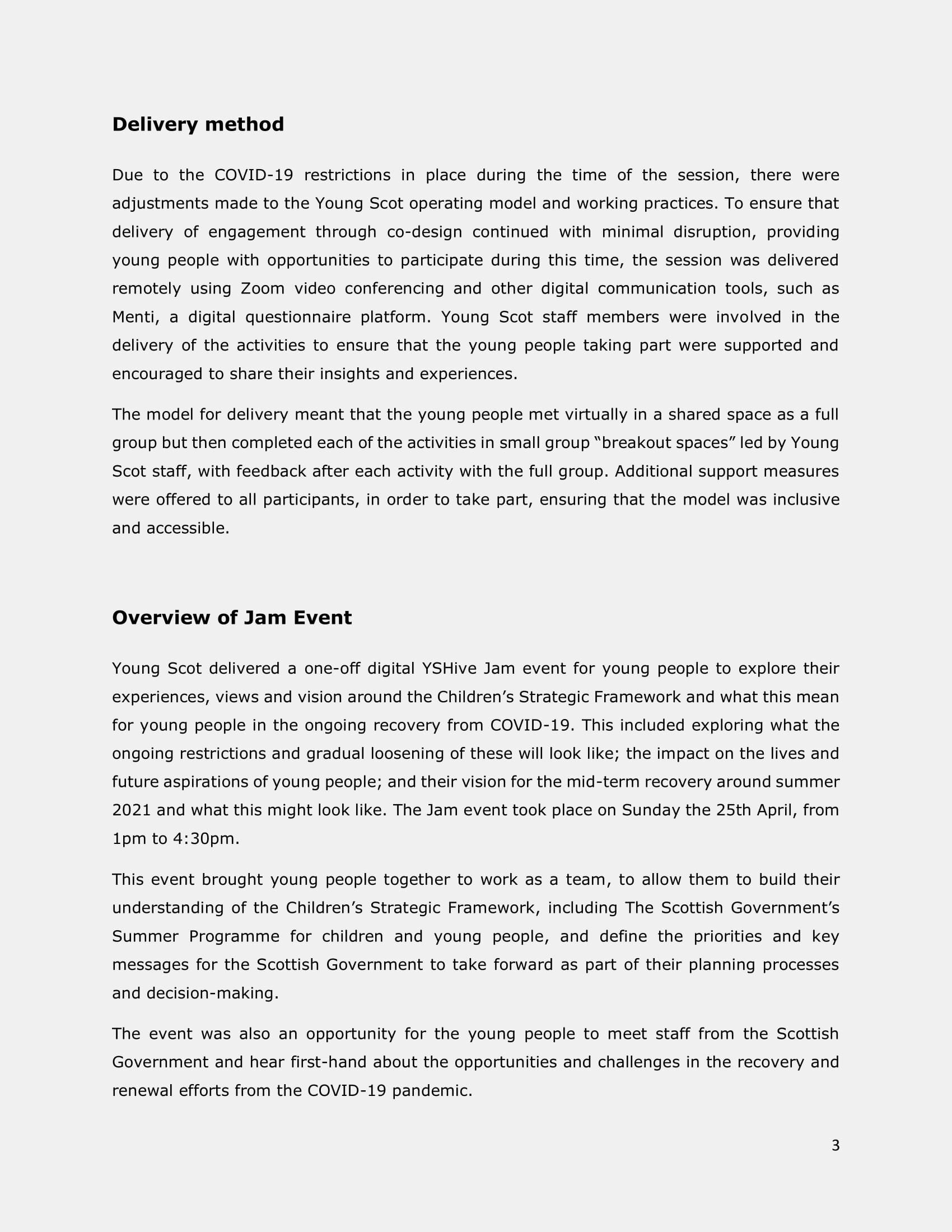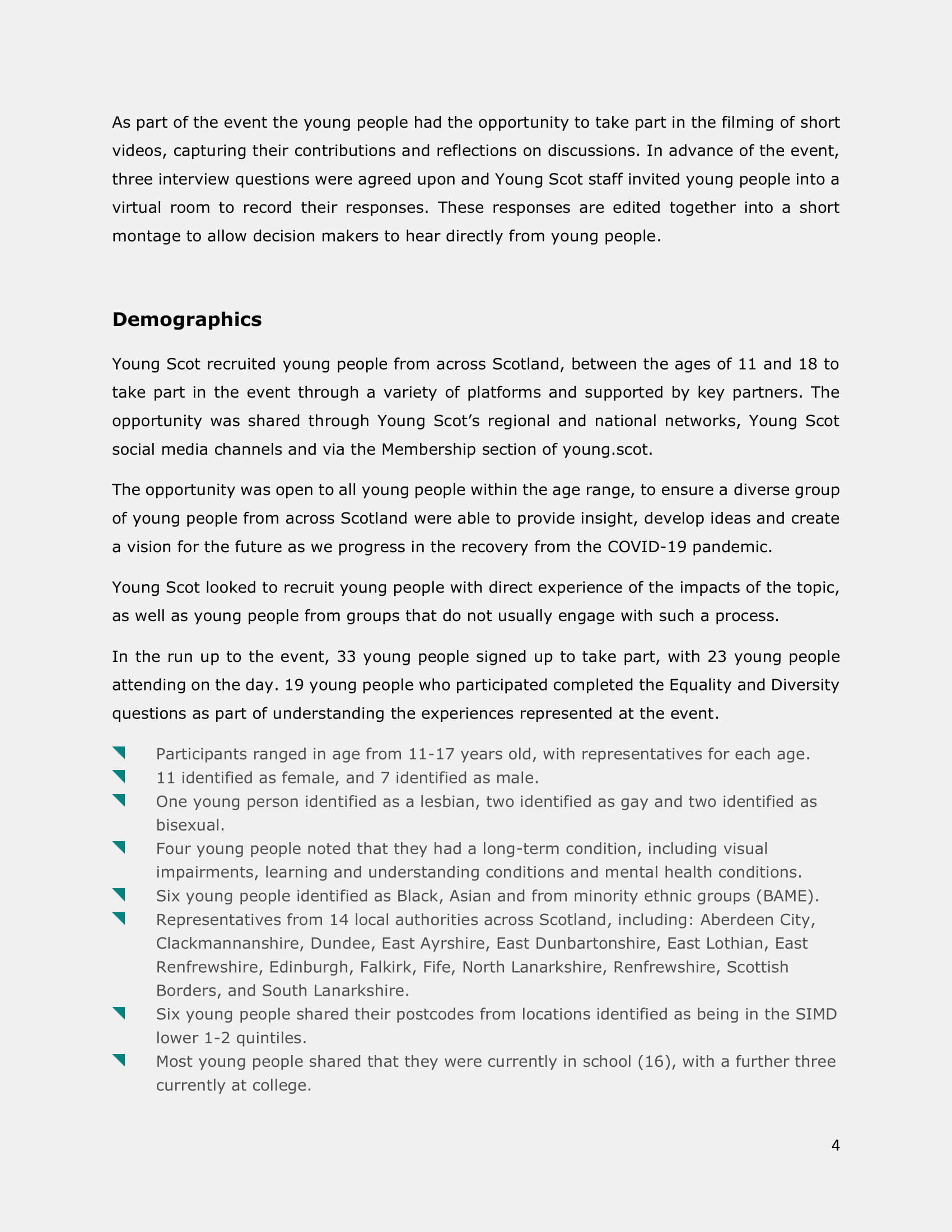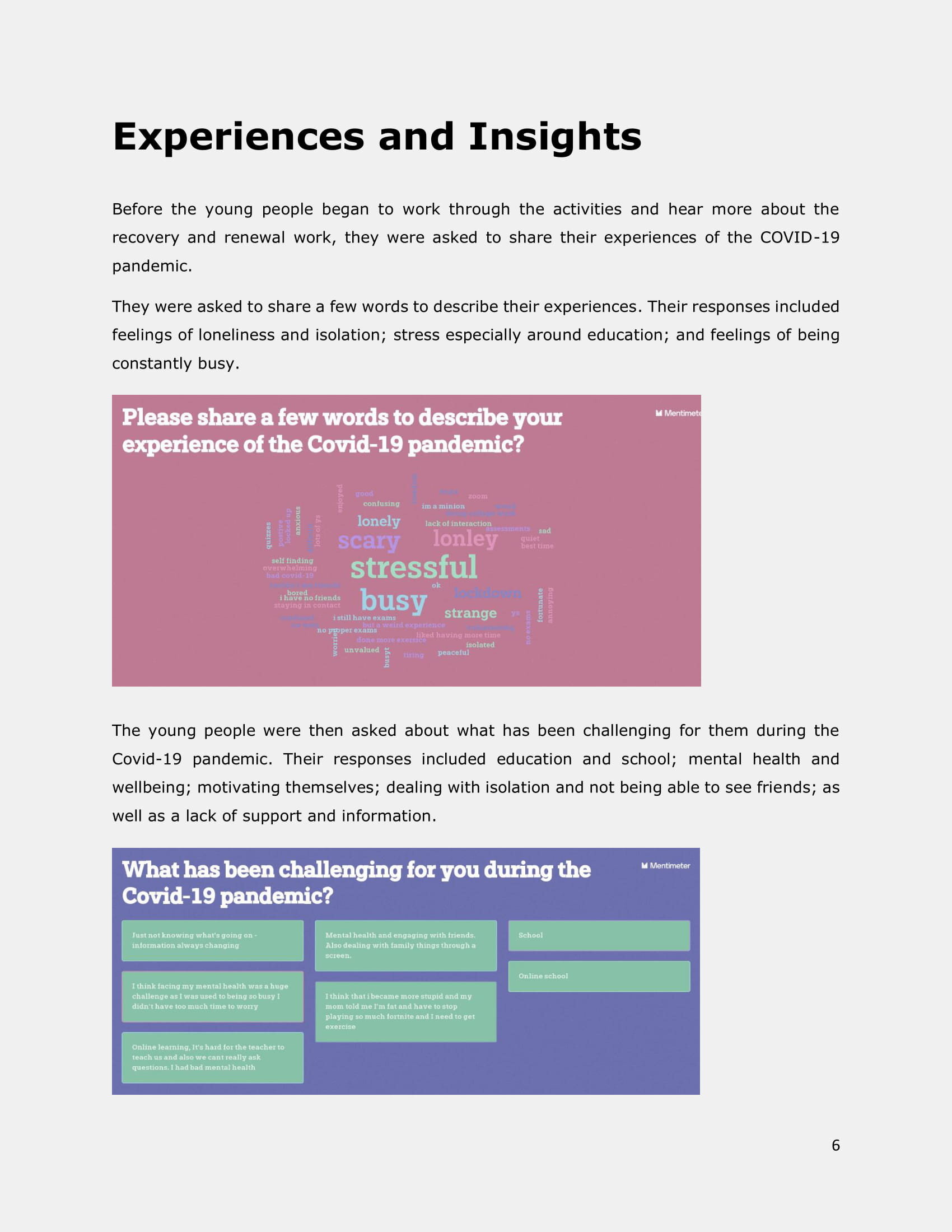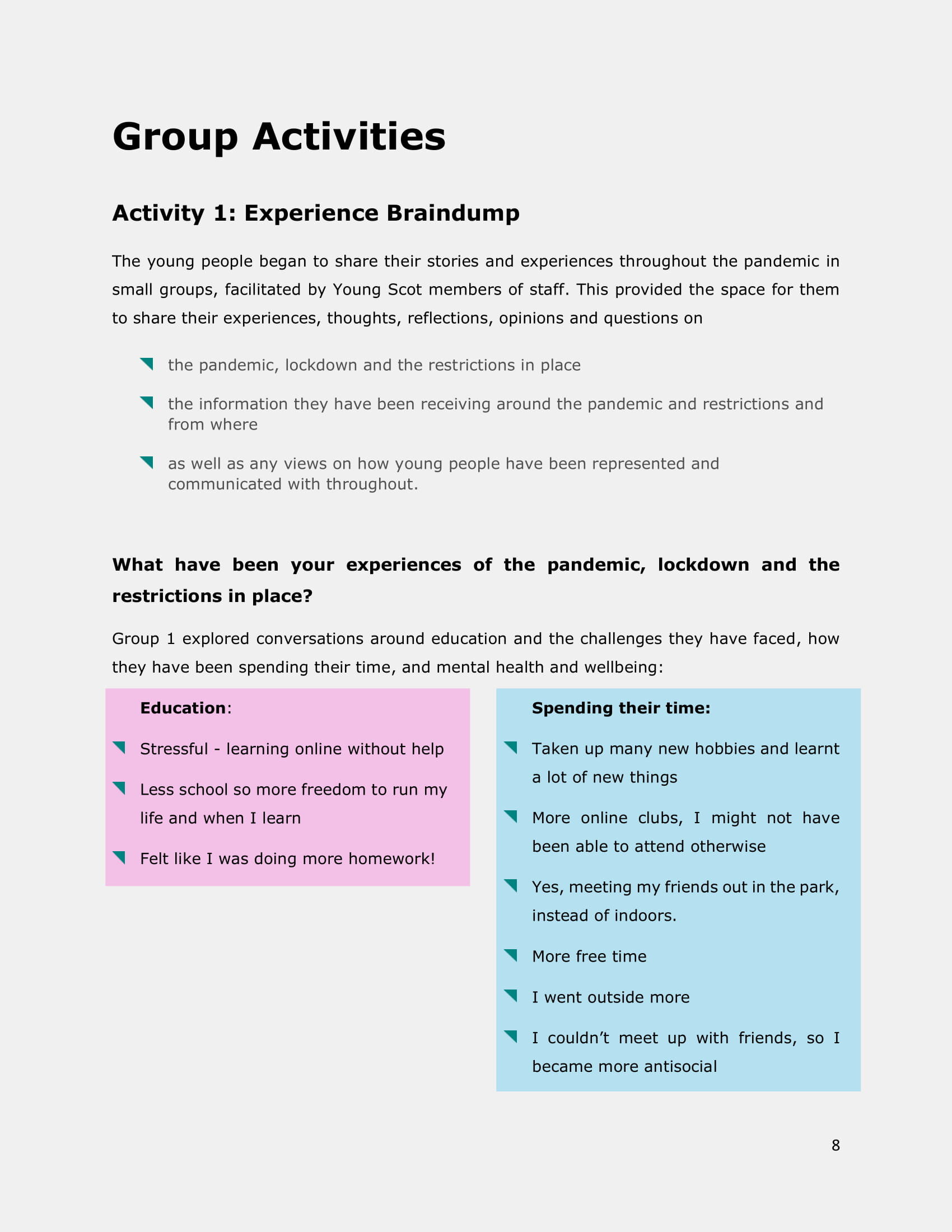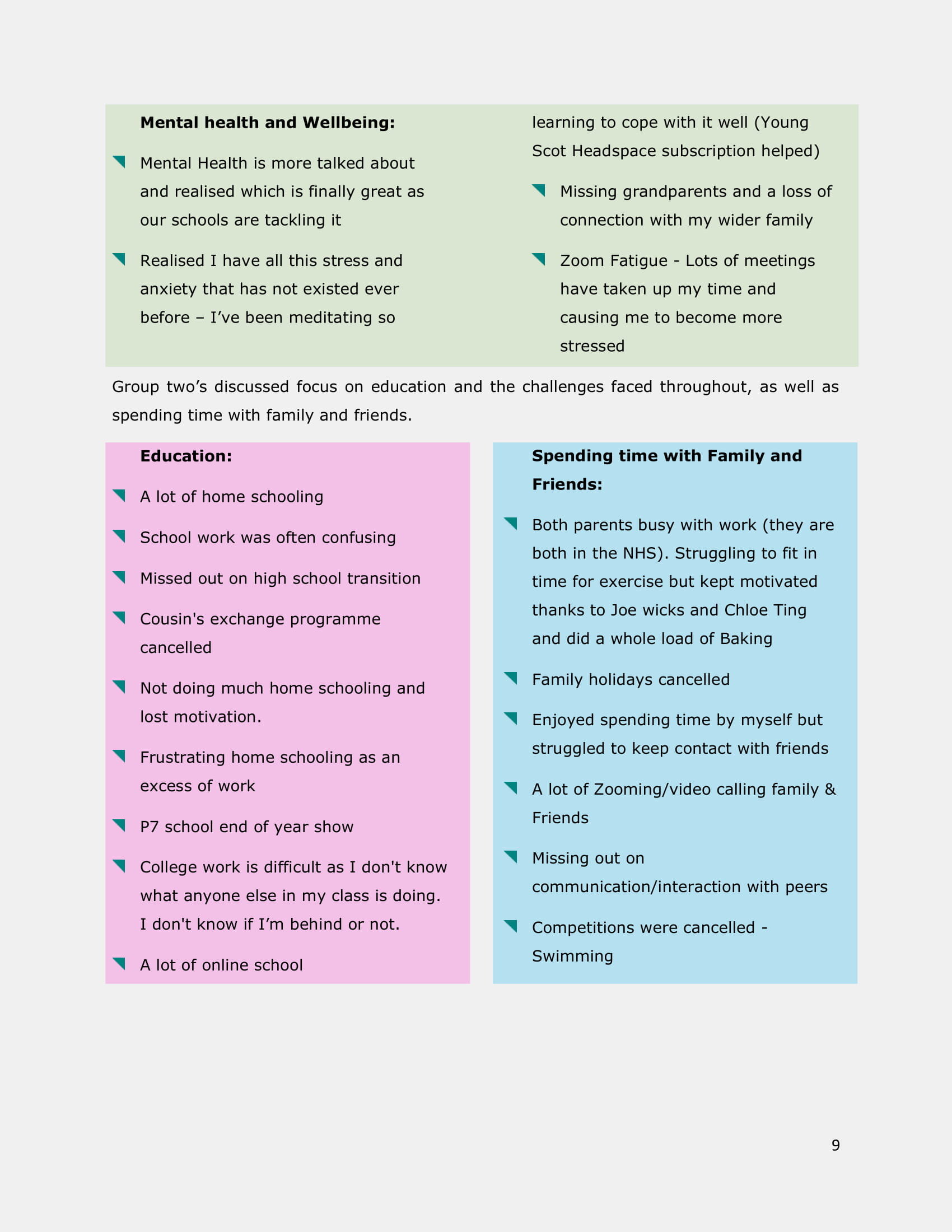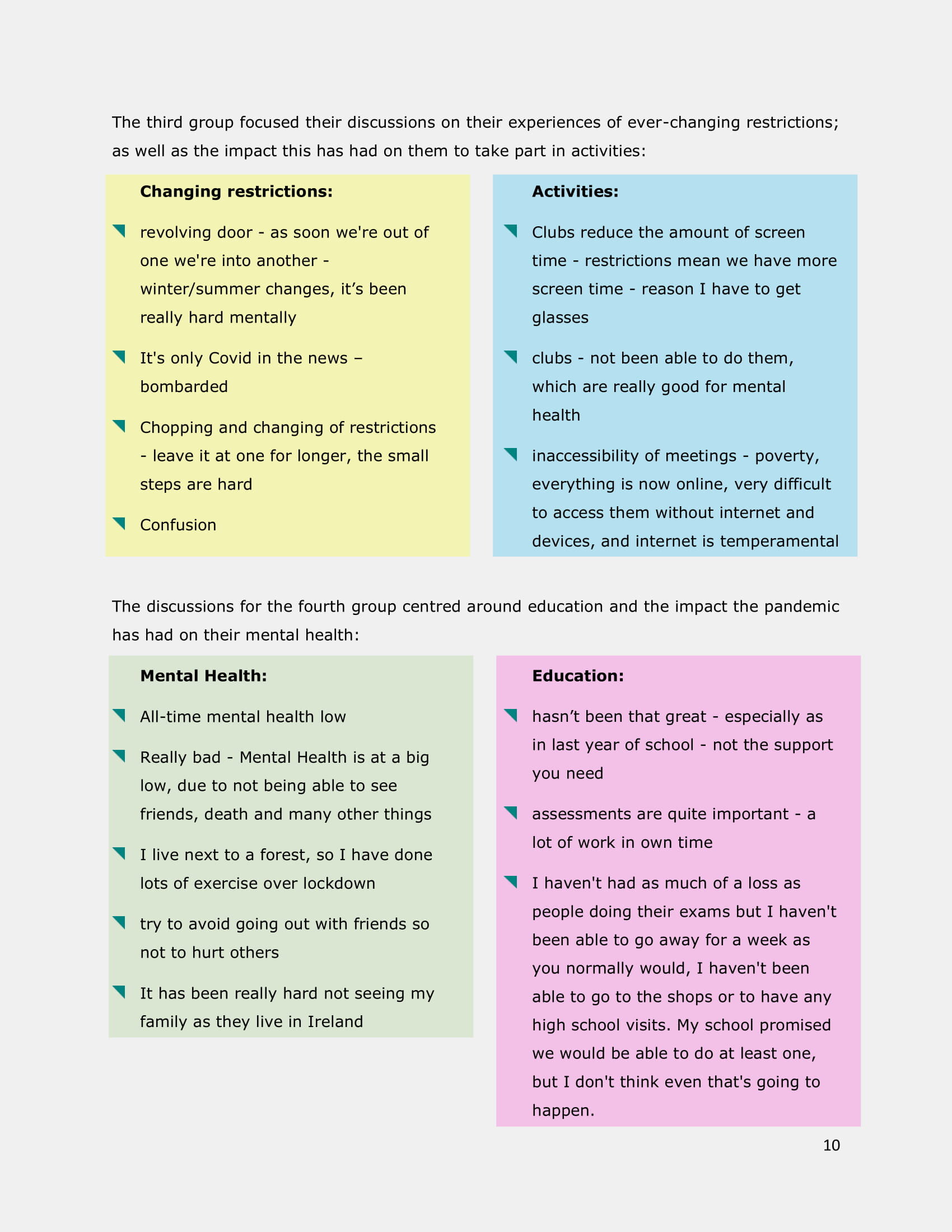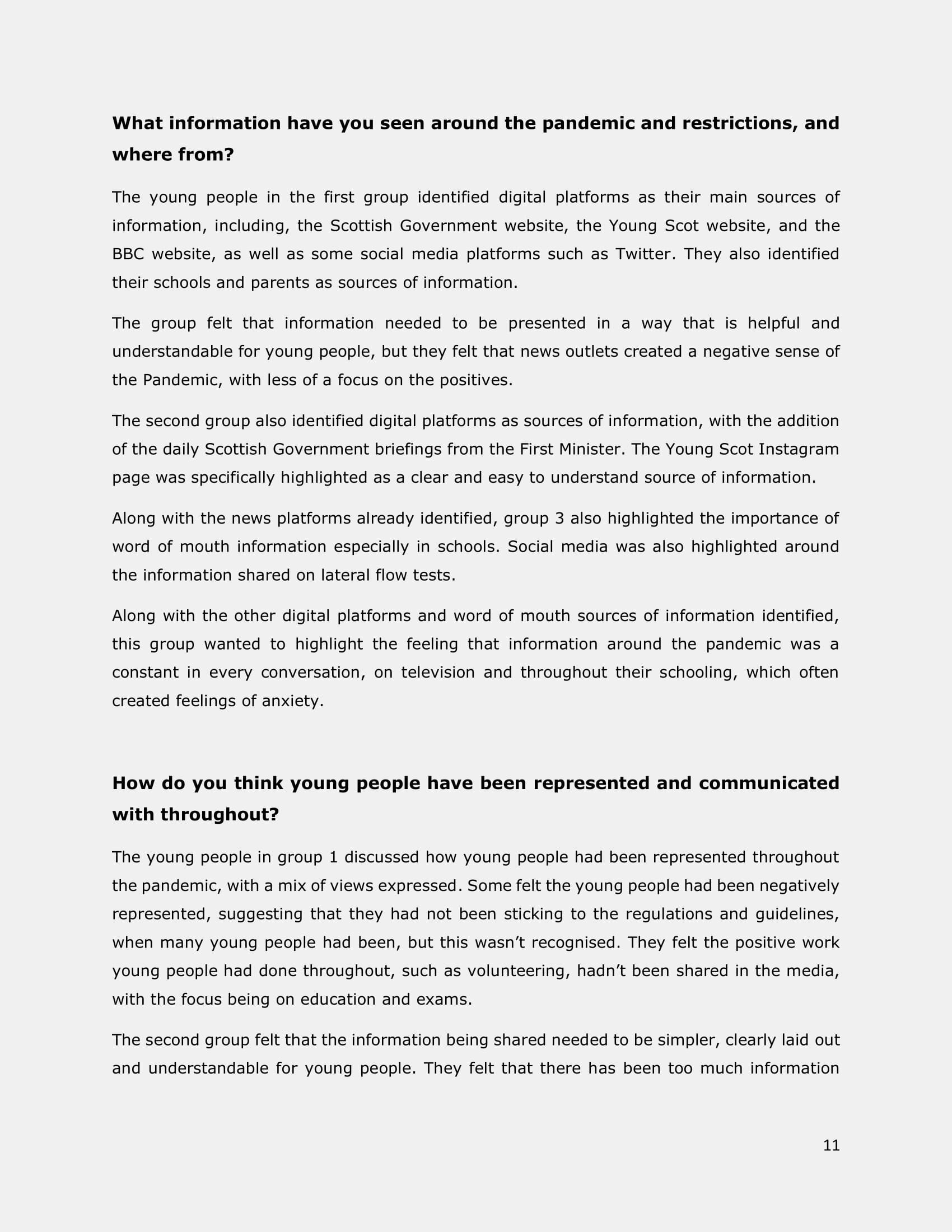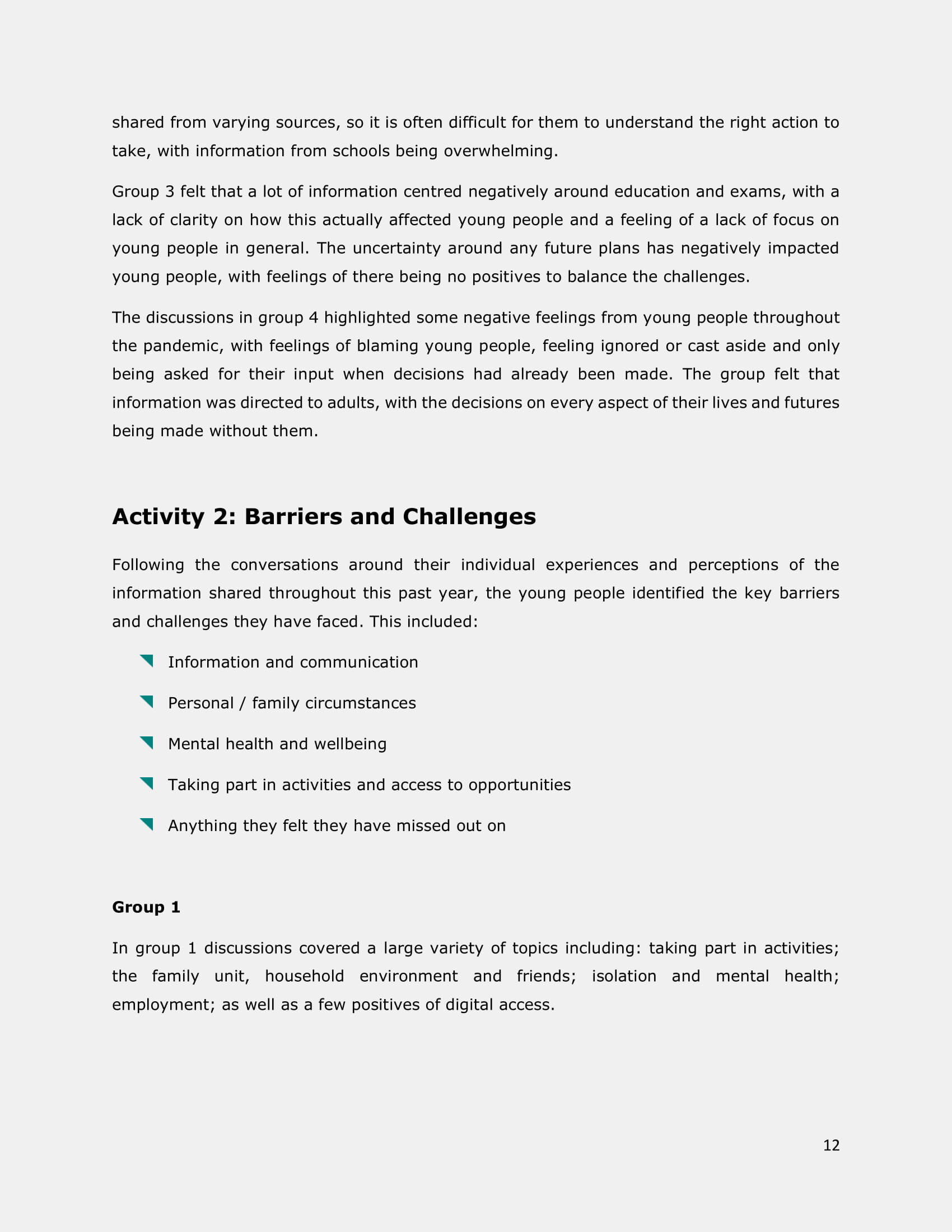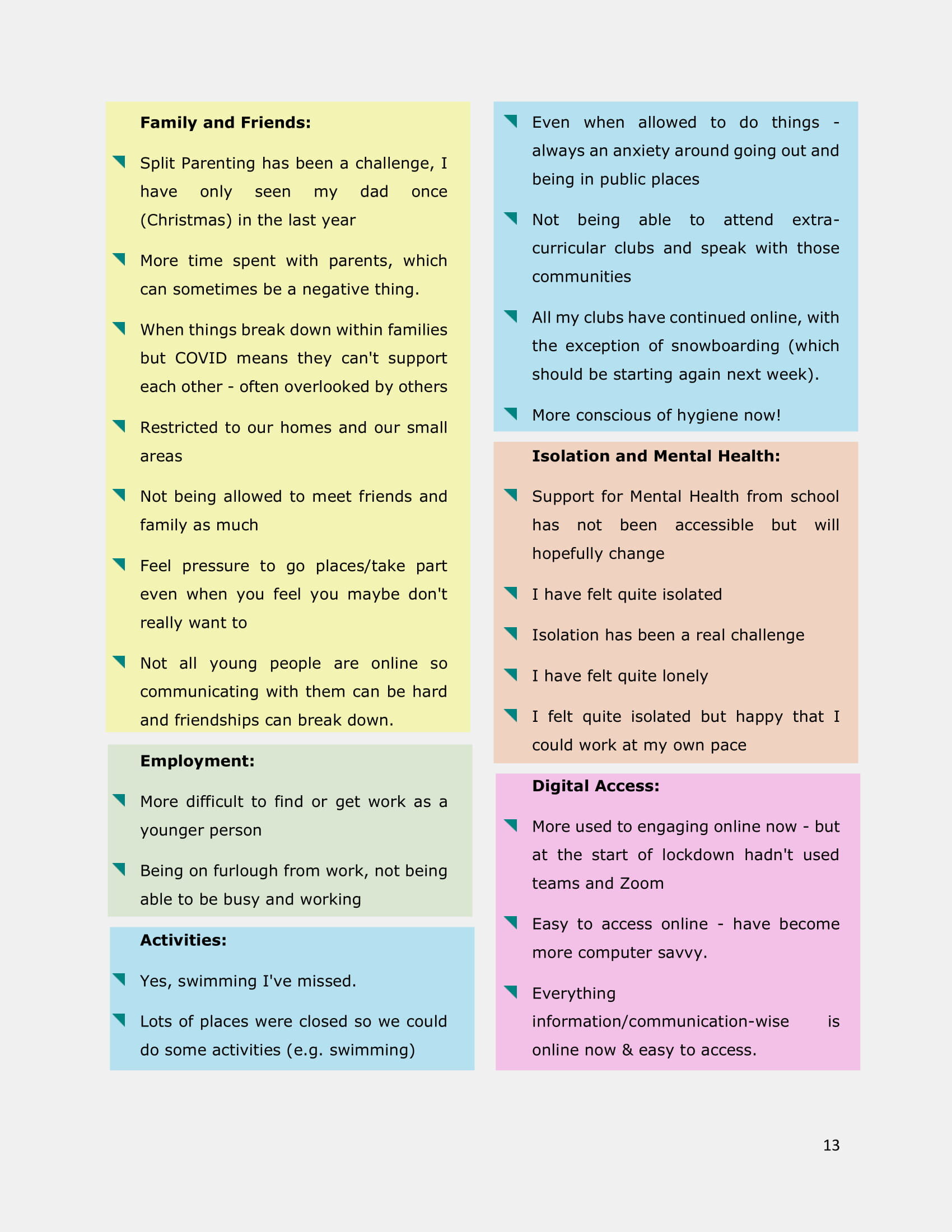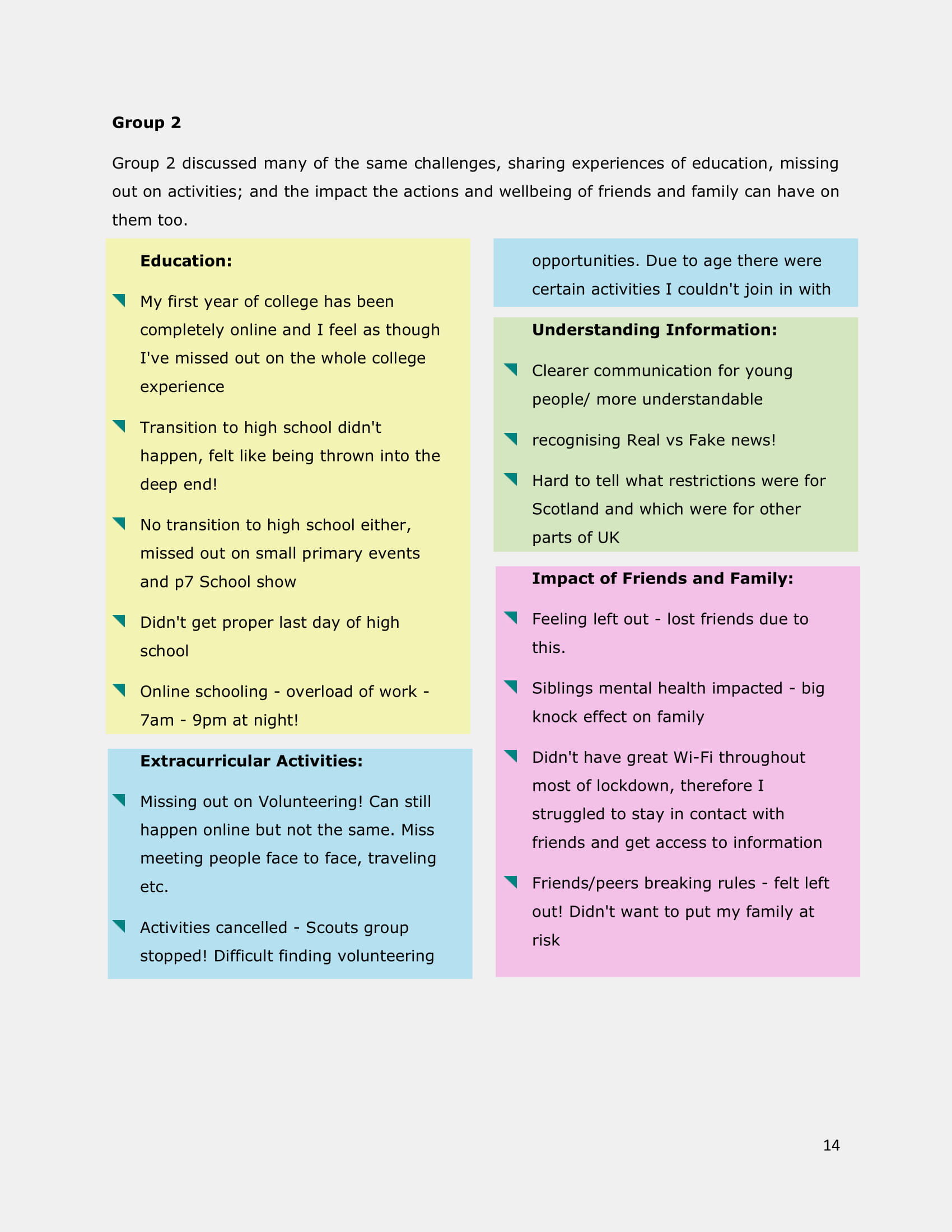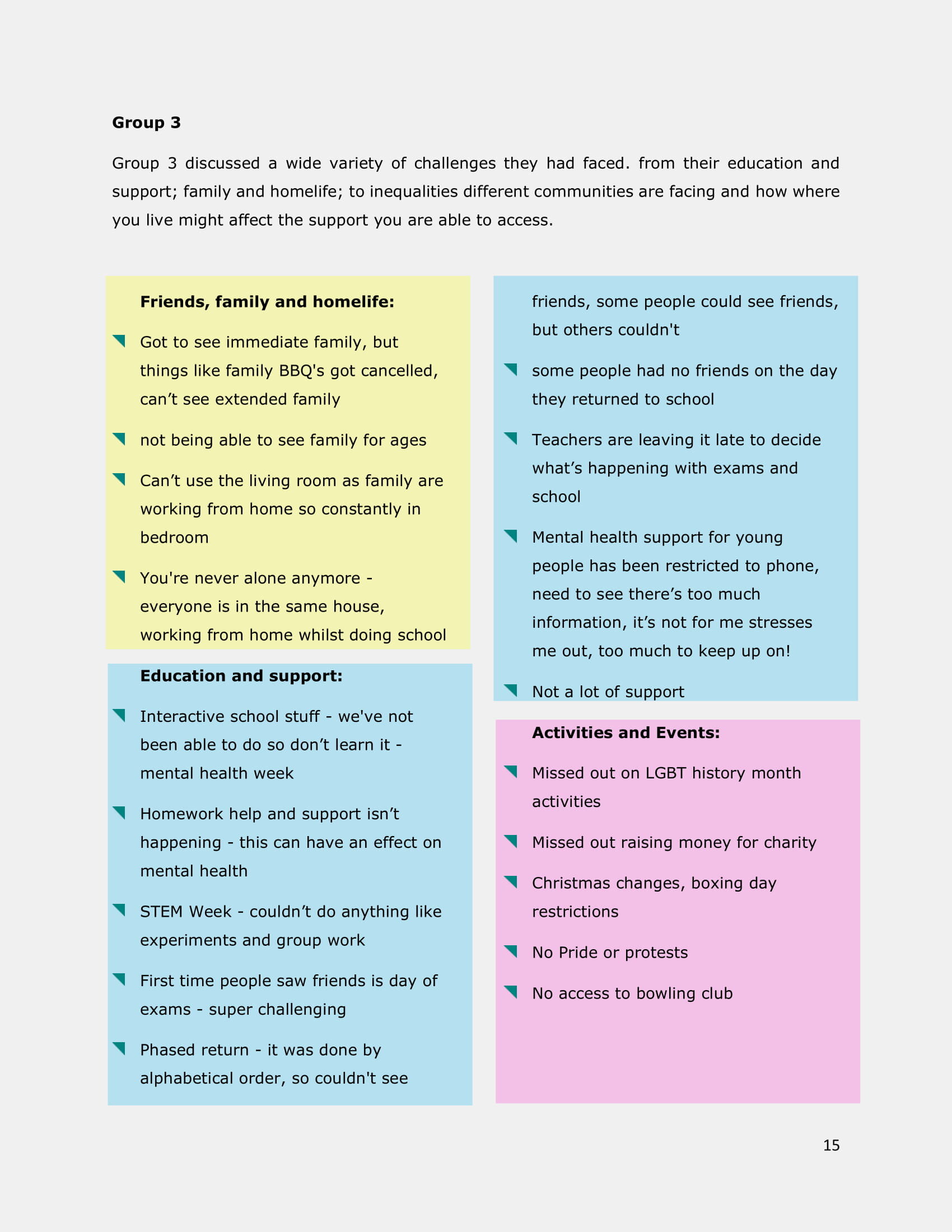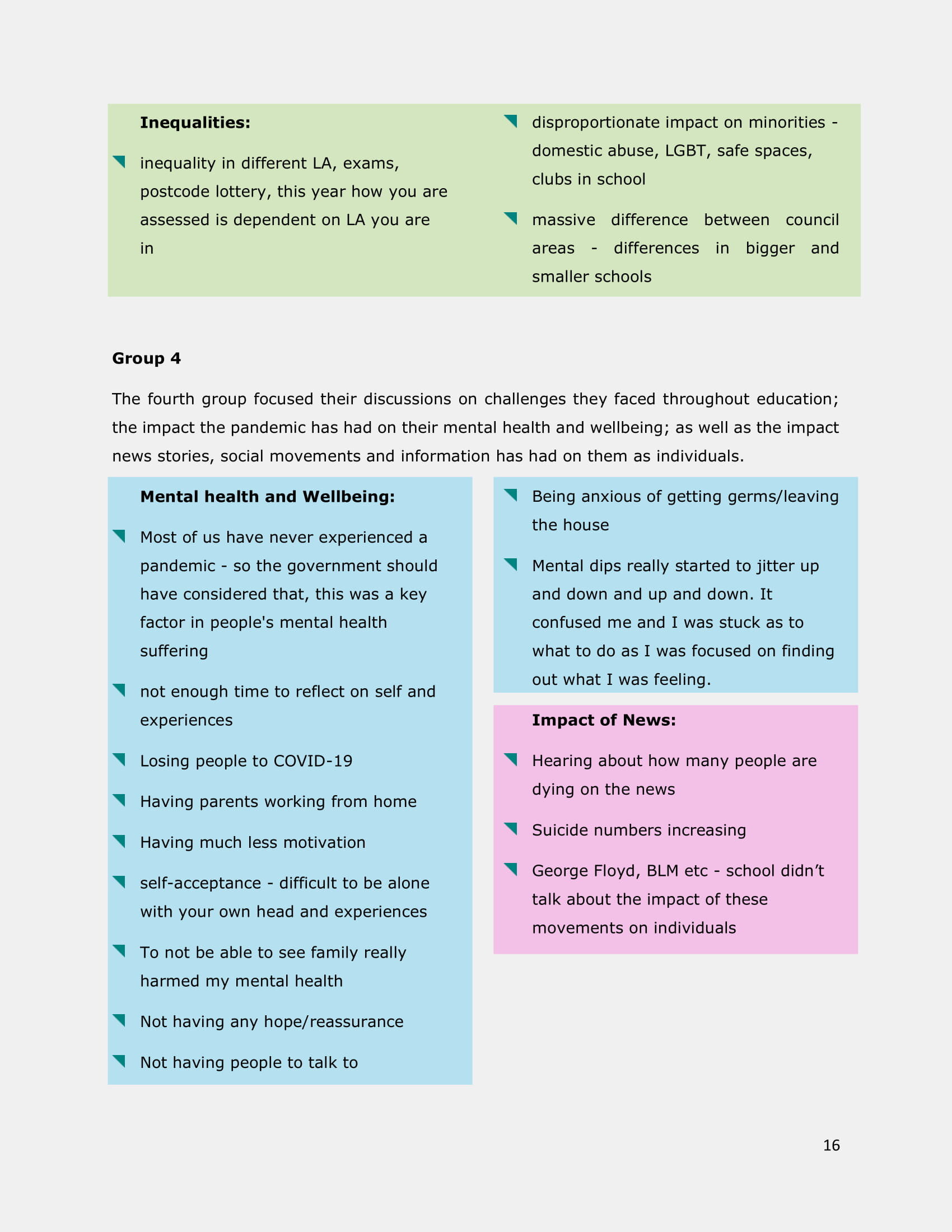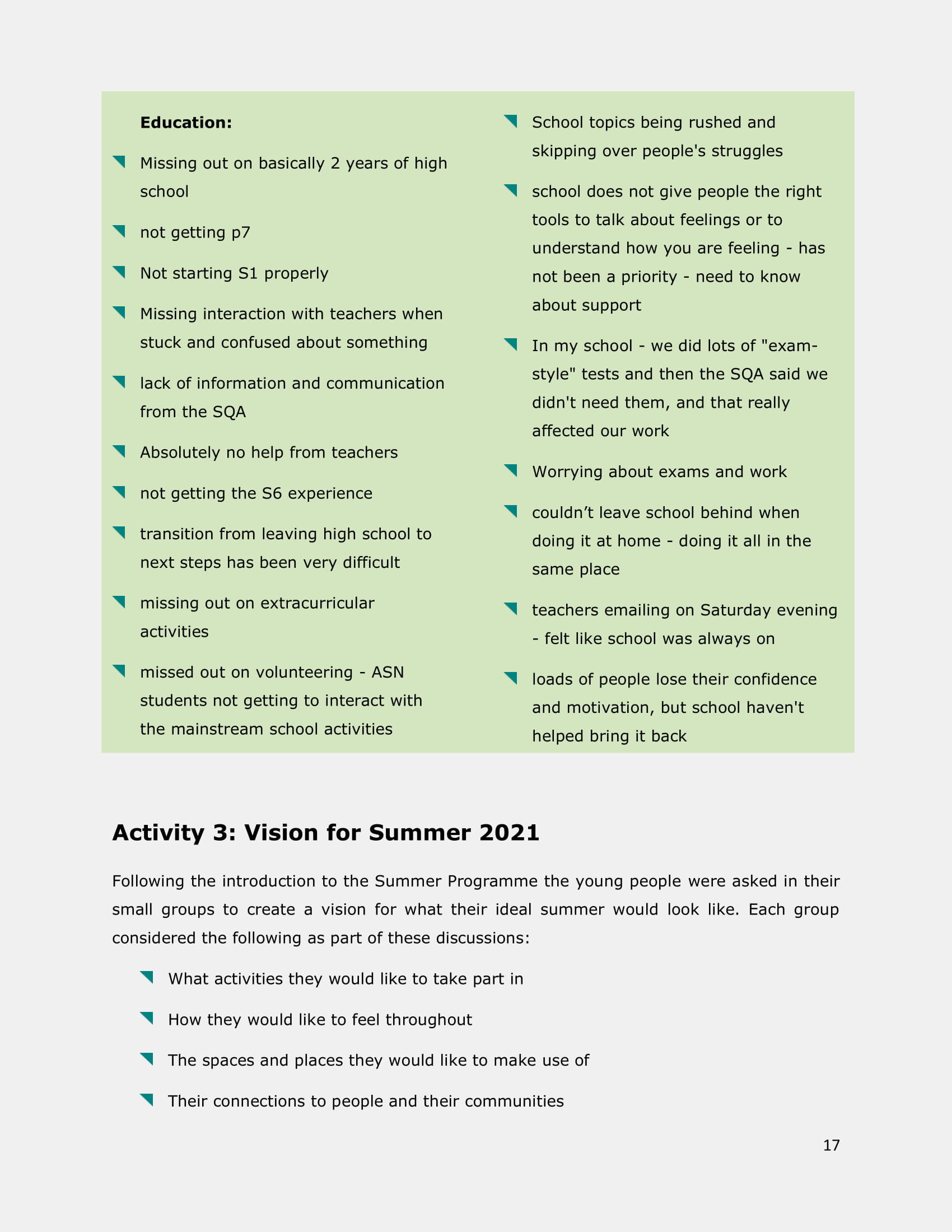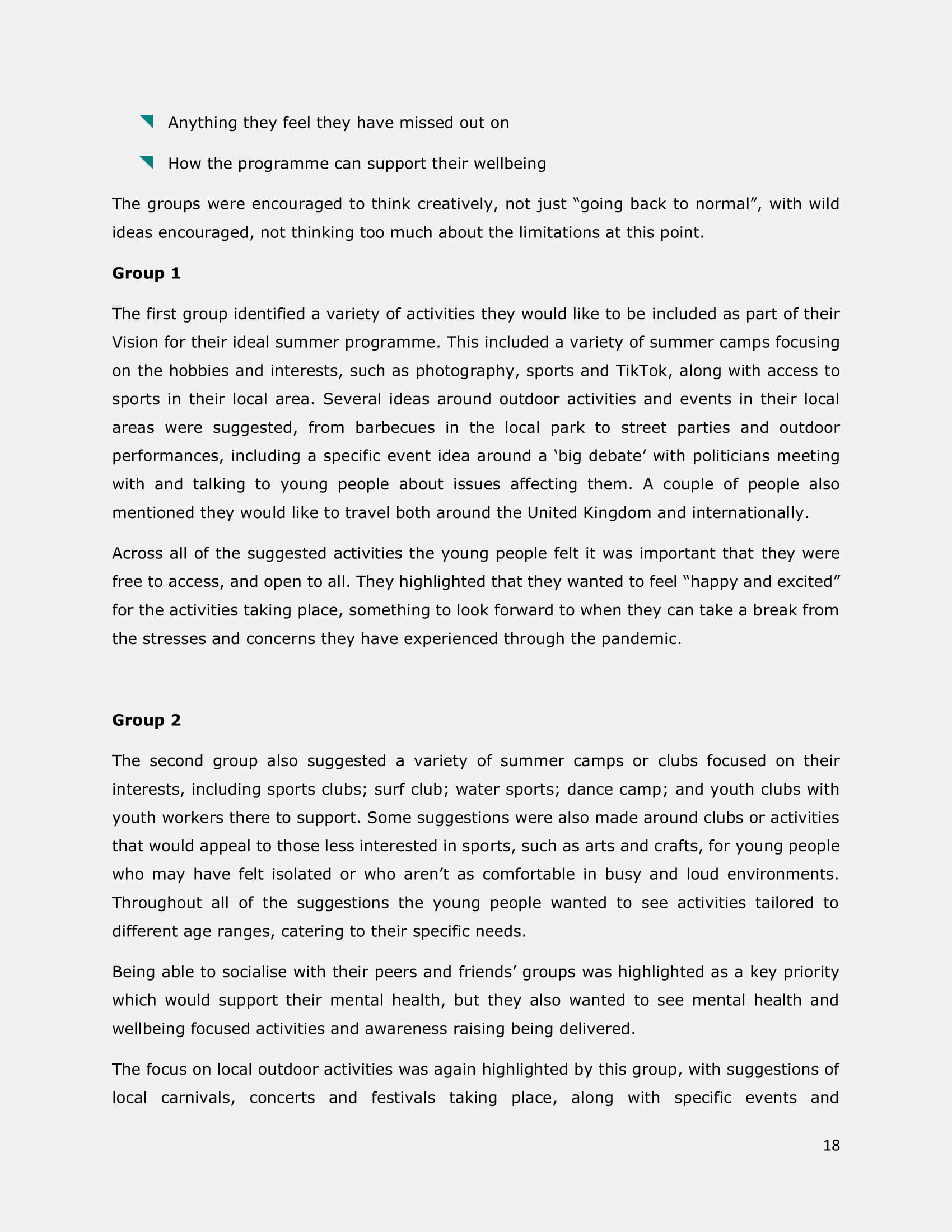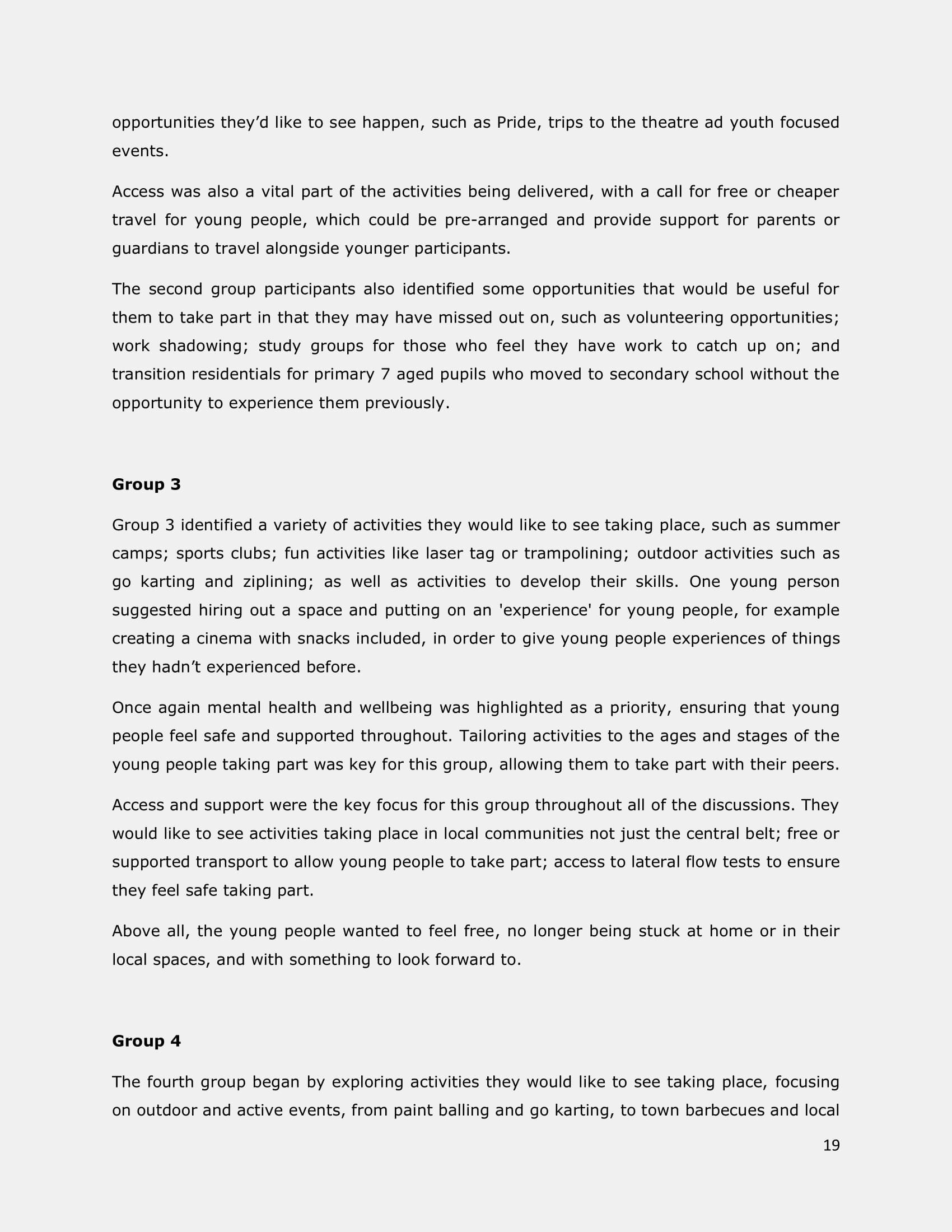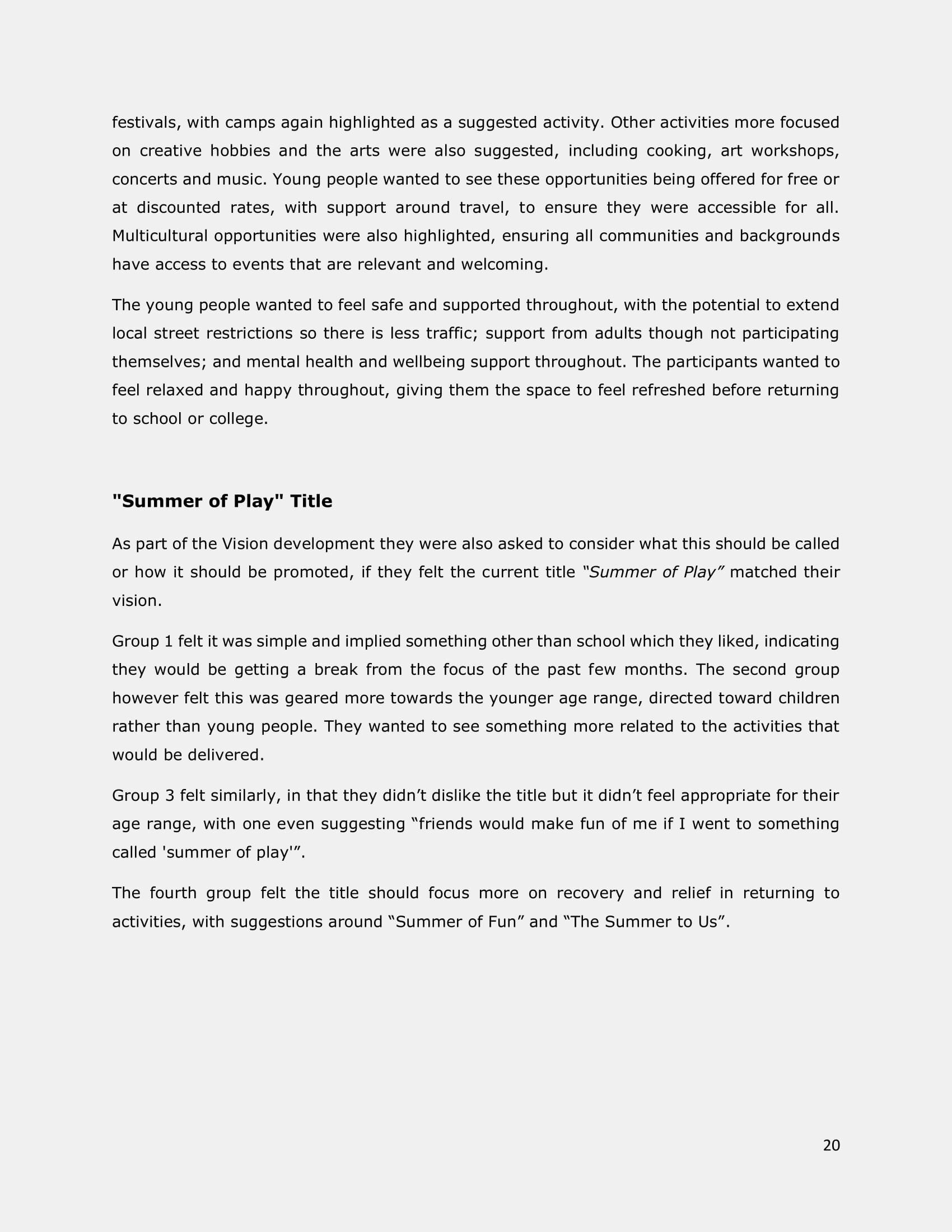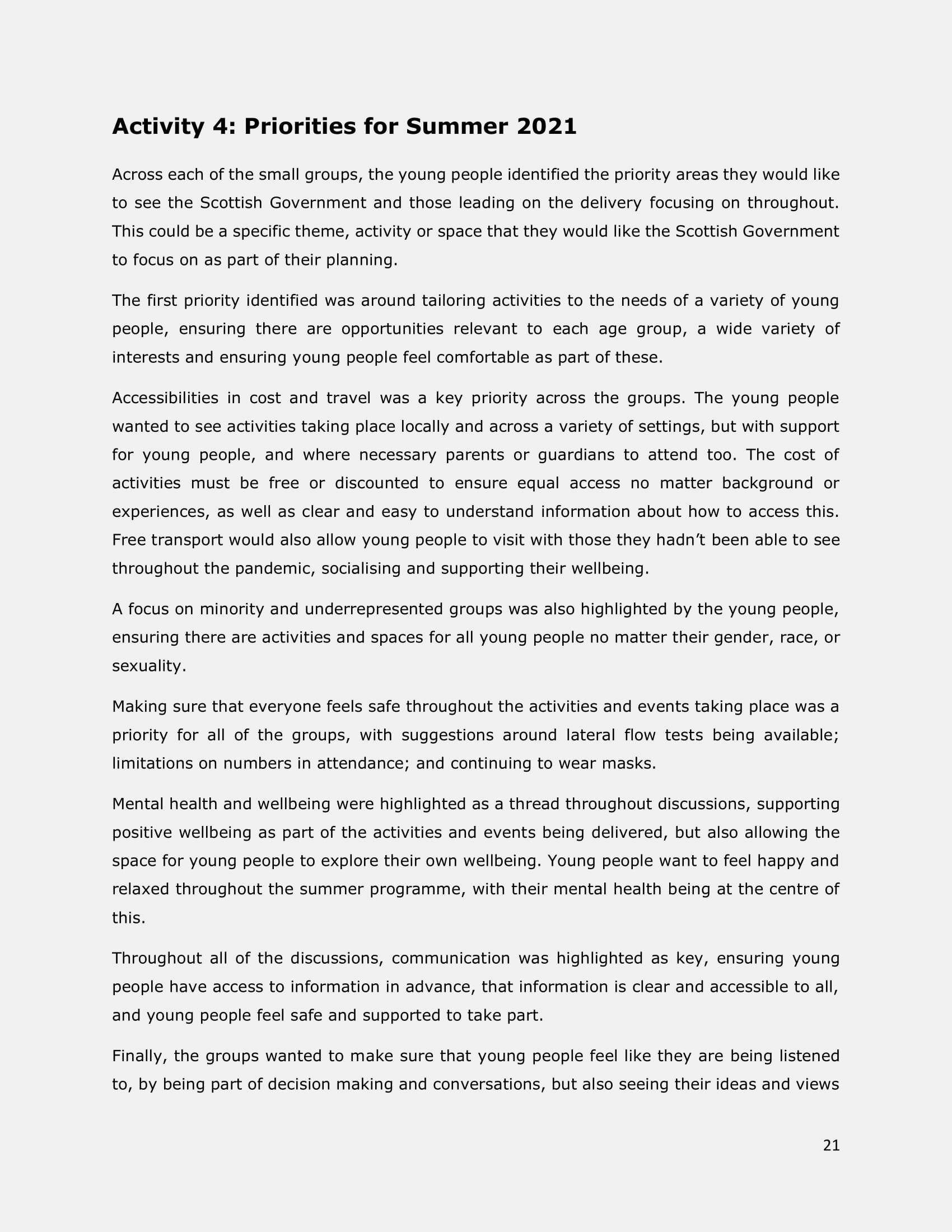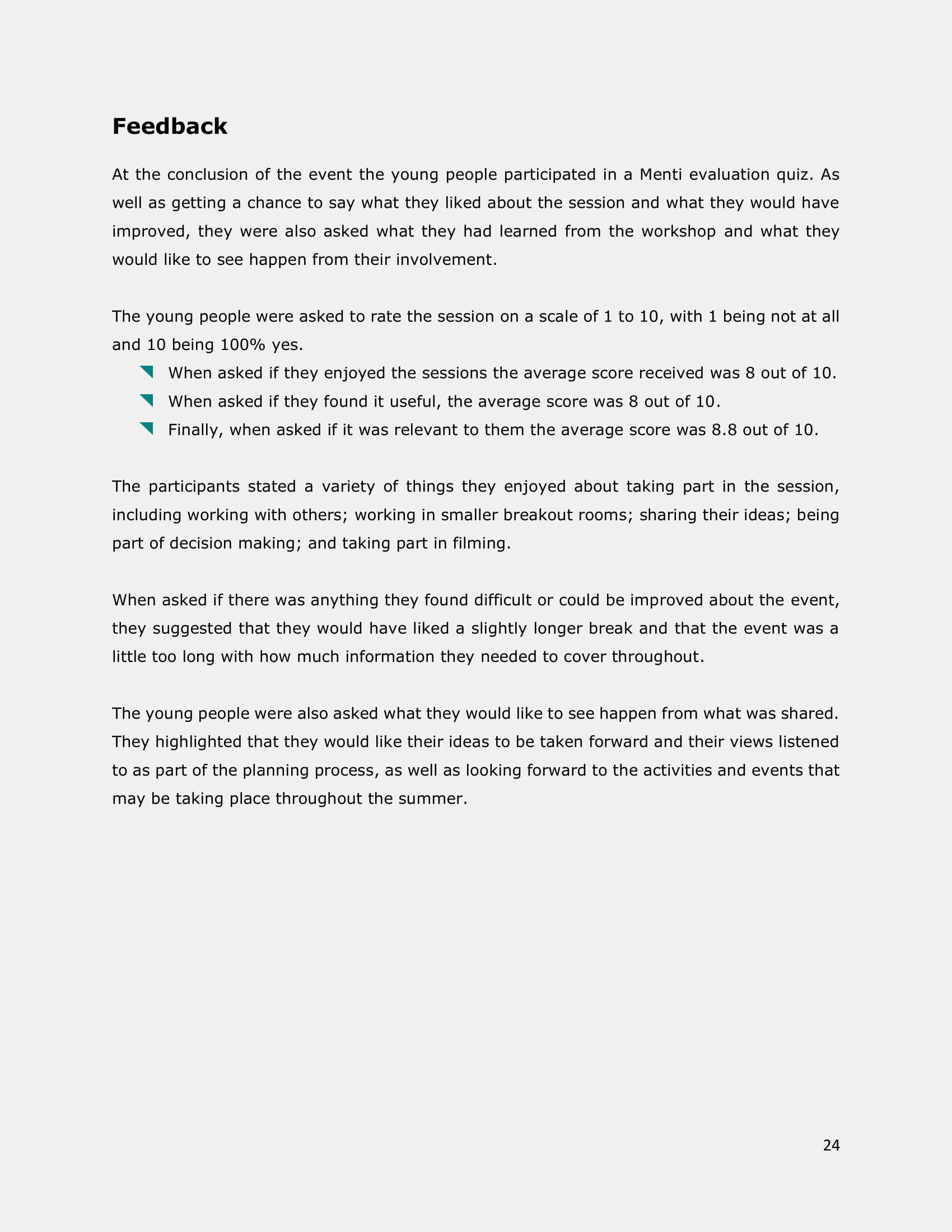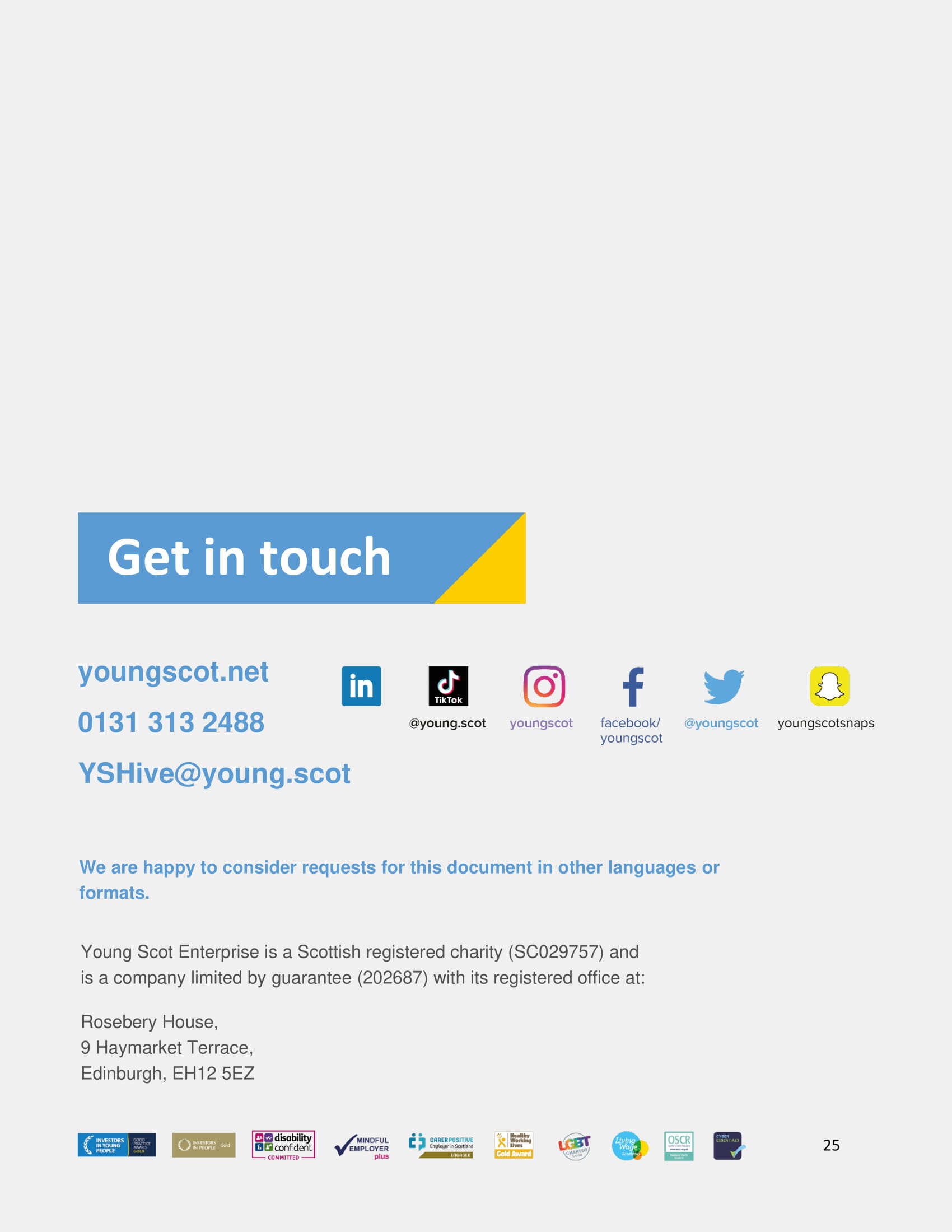#YSHive Jam: Exploration of COVID-19 Recovery
Young Scot delivered an initial one-off Jam event with the Scottish Government to work directly with young people to explore the Children’s Strategic Framework in the recovery from COVID-19, understand young people’s vision as part of the recovery and their hopes and ambitions for young people’s involvement in shaping this in future.
This engagement with young people allowed the Scottish Government to understand the impacts COVID-19 continues to have and support their input in the development of plans to tackle these, with a view of ensuring young people continue to be involved throughout the decision-making process.
iThe outcomes of this event were to:
Gather views and insights of a diverse group of young people, around the impact of COVID-19 and the global pandemic on their hopes, aspirations and needs as we look at recovery and renewal.
Create equitable space for debate and conversation between young people and decision makers in this space
Explore and constructively challenge decision makers around COVID-19 recovery work with the aim of improving the situation for young people
Develop ideas and recommendations for implementation to support young people throughout the recovery process
Represent the views, experiences and ideas developed by the young people in a visually engaging output to ensure young people are considered as part of the ongoing decision-making processes around the Strategic Framework
Recognising the long-term impacts of COVID-19, consider long term sustainable system change throughout
You can scroll through a preview of our report, download a full pdf version using the Download button or access a plain text version of our report below.
Plain Text Version
COVID-19 Renewal Jam
The Scottish Government
April 2021
Introduction
Young Scot delivered an initial one-off Jam event with the Scottish Government to work directly with young people to explore the Children’s Strategic Framework in the recovery from COVID-19, understand young people’s vision as part of the recovery and their hopes and ambitions for young people’s involvement in shaping this in future.
The event follows and builds upon previous conversations between Scottish Government and Young Scot, from wider engagement work with young people such as the Lockdown Lowdown surveys, delivered by Scottish Youth Parliament, YouthLink Scotland and Young Scot, supported by the Scottish Government; as well as other COVID-19 recovery sessions delivered by the Young Scot YSHive team, including exploring the mid to long-term impacts of the COVID-19 pandemic on young people.
Young Scot supported engagement with young people to allow the Scottish Government to understand the impact COVID-19 continues to have and support their input in the development of plans to tackle these, with a view of ensuring young people continue to be involved throughout the decision-making process.
The outcomes of this event were to:
Gather views and insights of a diverse group of young people, around the impact of COVID-19 and the global pandemic on their hopes, aspirations and needs as we look at recovery and renewal.
Create equitable space for debate and conversation between young people and decision makers in this space
Explore and constructively challenge decision makers around COVID-19 recovery work with the aim of improving the situation for young people
Develop ideas and recommendations for implementation to support young people throughout the recovery process
Represent the views, experiences and ideas developed by the young people in a visually engaging output to ensure young people are considered as part of the ongoing decision-making processes around the Strategic Framework
Recognising the long-term impacts of COVID-19, consider long term sustainable system change throughout
Delivery method
Due to the COVID-19 restrictions in place during the time of the session, there were adjustments made to the Young Scot operating model and working practices. To ensure that delivery of engagement through co-design continued with minimal disruption, providing young people with opportunities to participate during this time, the session was delivered remotely using Zoom video conferencing and other digital communication tools, such as Menti, a digital questionnaire platform. Young Scot staff members were involved in the delivery of the activities to ensure that the young people taking part were supported and encouraged to share their insights and experiences.
The model for delivery meant that the young people met virtually in a shared space as a full group but then completed each of the activities in small group “breakout spaces” led by Young Scot staff, with feedback after each activity with the full group. Additional support measures were offered to all participants, in order to take part, ensuring that the model was inclusive and accessible.
Overview of Jam Event
Young Scot delivered a one-off digital YSHive Jam event for young people to explore their experiences, views and vision around the Children’s Strategic Framework and what this mean for young people in the ongoing recovery from COVID-19. This included exploring what the ongoing restrictions and gradual loosening of these will look like; the impact on the lives and future aspirations of young people; and their vision for the mid-term recovery around summer 2021 and what this might look like. The Jam event took place on Sunday the 25th April, from 1pm to 4:30pm.
This event brought young people together to work as a team, to allow them to build their understanding of the Children’s Strategic Framework, including The Scottish Government’s Summer Programme for children and young people, and define the priorities and key messages for the Scottish Government to take forward as part of their planning processes and decision-making.
The event was also an opportunity for the young people to meet staff from the Scottish Government and hear first-hand about the opportunities and challenges in the recovery and renewal efforts from the COVID-19 pandemic.
As part of the event the young people had the opportunity to take part in the filming of short videos, capturing their contributions and reflections on discussions. In advance of the event, three interview questions were agreed upon and Young Scot staff invited young people into a virtual room to record their responses. These responses are edited together into a short montage to allow decision makers to hear directly from young people.
Demographics
Young Scot recruited young people from across Scotland, between the ages of 11 and 18 to take part in the event through a variety of platforms and supported by key partners. The opportunity was shared through Young Scot’s regional and national networks, Young Scot social media channels and via the Membership section of young.scot.
The opportunity was open to all young people within the age range, to ensure a diverse group of young people from across Scotland were able to provide insight, develop ideas and create a vision for the future as we progress in the recovery from the COVID-19 pandemic.
Young Scot looked to recruit young people with direct experience of the impacts of the topic, as well as young people from groups that do not usually engage with such a process.
In the run up to the event, 33 young people signed up to take part, with 23 young people attending on the day. 19 young people who participated completed the Equality and Diversity questions as part of understanding the experiences represented at the event.
Participants ranged in age from 11-17 years old, with representatives for each age.
11 identified as female, and 7 identified as male.
One young person identified as a lesbian, two identified as gay and two identified as bisexual.
Four young people noted that they had a long-term condition, including visual impairments, learning and understanding conditions and mental health conditions.
Six young people identified as Black, Asian and from minority ethnic groups (BAME).
Representatives from 14 local authorities across Scotland, including: Aberdeen City, Clackmannanshire, Dundee, East Ayrshire, East Dunbartonshire, East Lothian, East Renfrewshire, Edinburgh, Falkirk, Fife, North Lanarkshire, Renfrewshire, Scottish Borders, and South Lanarkshire.
Six young people shared their postcodes from locations identified as being in the SIMD lower 1-2 quintiles.
Most young people shared that they were currently in school (16), with a further three currently at college.
Summary
Throughout the Jam event the young people shared their experiences, identified the challenges they have faced and looked to the future on what they would like to see put in place for young people, how this will be communicated and how young people can be at the centre of decision-making.
The young people who took part shared how the COVID-19 pandemic had affected them, both positively and with difficult experiences throughout, these covered education; how they had been spending their time; family and friends; as well as how this had affected their mental health and wellbeing.
They had received information through a variety of formats, from social media accounts from the Scottish Government and Young Scot, to word of mouth via friends, family and through education. Throughout the majority of the communication around the pandemic, the participants felt that young people were either negatively represented or left out of direct communication, which they also felt lacked clarity.
When discussing the barriers and challenges they had face, the young people identified a variety, including through education; employment; digital access; extracurricular opportunities; the impact of friends and family; inequalities; the impact of news; and isolation, mental health and wellbeing.
As part of the Jam event, the young people developed a vision of what they would like to see put in place for the 2021 summer programme, exploring activities, spaces and place, how they would like to feel and connections to their peers and communities. The priorities identified centred on accessibility for all young people; ensuring activities were tailored to all communities with a focus on underrepresented groups; supporting mental health and wellbeing; ensuring young people feel safe and supported to take part; clear information and guidance; as well as ensuring young people are at the centre of delivery.
The young people who participated wanted to see young people taking a role in decision-making throughout the summer programme and in recovery and renewal efforts around the COVID-19 pandemic, from sharing information and guidance, to ensure that young people’s interests can be at the heart of decisions that are being around their future, including opportunities and support provided to them.
Experiences and Insights
Before the young people began to work through the activities and hear more about the recovery and renewal work, they were asked to share their experiences of the COVID-19 pandemic.
They were asked to share a few words to describe their experiences. Their responses included feelings of loneliness and isolation; stress especially around education; and feelings of being constantly busy.
The young people were then asked about what has been challenging for them during the Covid-19 pandemic. Their responses included education and school; mental health and wellbeing; motivating themselves; dealing with isolation and not being able to see friends; as well as a lack of support and information.
The participants were asked to think about anything that they have valued during the COVID-19 pandemic. Their responses included spending time with family; spending time doing hobbies or activities themselves; connecting digitally with friends and family; and having the freedom to spend their time in a way that works for them.
Finally, the young people were asked if there had been anything surprising during the COVID-19 pandemic. Their answers included events that had happened within their families; the length of time they have spent under restrictions; and the sense of community and community empowerment that has come throughout.
Group Activities
Activity 1: Experience Braindump
The young people began to share their stories and experiences throughout the pandemic in small groups, facilitated by Young Scot members of staff. This provided the space for them to share their experiences, thoughts, reflections, opinions and questions on
the pandemic, lockdown and the restrictions in place
the information they have been receiving around the pandemic and restrictions and from where
as well as any views on how young people have been represented and communicated with throughout.
What have been your experiences of the pandemic, lockdown and the restrictions in place?
Group 1 explored conversations around education and the challenges they have faced, how they have been spending their time, and mental health and wellbeing:
Education:
Stressful - learning online without help
Less school so more freedom to run my life and when I learn
Felt like I was doing more homework!
Spending their time:
Taken up many new hobbies and learnt a lot of new things
More online clubs, I might not have been able to attend otherwise
Yes, meeting my friends out in the park, instead of indoors.
More free time
I went outside more
I couldn’t meet up with friends, so I became more antisocial
Mental health and Wellbeing:
Mental Health is more talked about and realised which is finally great as our schools are tackling it
Realised I have all this stress and anxiety that has not existed ever before – I’ve been meditating so learning to cope with it well (Young Scot Headspace subscription helped)
Missing grandparents and a loss of connection with my wider family
Zoom Fatigue - Lots of meetings have taken up my time and causing me to become more stressed
Group two’s discussed focus on education and the challenges faced throughout, as well as spending time with family and friends.
Education:
A lot of home schooling
School work was often confusing
Missed out on high school transition
Cousin's exchange programme cancelled
Not doing much home schooling and lost motivation.
Frustrating home schooling as an excess of work
P7 school end of year show
College work is difficult as I don't know what anyone else in my class is doing. I don't know if I’m behind or not.
A lot of online school
Spending time with Family and Friends:
Both parents busy with work (they are both in the NHS). Struggling to fit in time for exercise but kept motivated thanks to Joe wicks and Chloe Ting and did a whole load of Baking
Family holidays cancelled
Enjoyed spending time by myself but struggled to keep contact with friends
A lot of Zooming/video calling family & Friends
Missing out on communication/interaction with peers
Competitions were cancelled - Swimming
The third group focused their discussions on their experiences of ever-changing restrictions; as well as the impact this has had on them to take part in activities:
Changing restrictions:
revolving door - as soon we're out of one we're into another - winter/summer changes, it’s been really hard mentally
It's only Covid in the news – bombarded
Chopping and changing of restrictions - leave it at one for longer, the small steps are hard
Confusion
Activities:
Clubs reduce the amount of screen time - restrictions mean we have more screen time - reason I have to get glasses
clubs - not been able to do them, which are really good for mental health
inaccessibility of meetings - poverty, everything is now online, very difficult to access them without internet and devices, and internet is temperamental
The discussions for the fourth group centred around education and the impact the pandemic has had on their mental health:
Mental Health:
All-time mental health low
Really bad - Mental Health is at a big low, due to not being able to see friends, death and many other things
I live next to a forest, so I have done lots of exercise over lockdown
try to avoid going out with friends so not to hurt others
It has been really hard not seeing my family as they live in Ireland
Education:
hasn’t been that great - especially as in last year of school - not the support you need
assessments are quite important - a lot of work in own time
I haven't had as much of a loss as people doing their exams but I haven't been able to go away for a week as you normally would, I haven't been able to go to the shops or to have any high school visits. My school promised we would be able to do at least one, but I don't think even that's going to happen.
What information have you seen around the pandemic and restrictions, and where from?
The young people in the first group identified digital platforms as their main sources of information, including, the Scottish Government website, the Young Scot website, and the BBC website, as well as some social media platforms such as Twitter. They also identified their schools and parents as sources of information.
The group felt that information needed to be presented in a way that is helpful and understandable for young people, but they felt that news outlets created a negative sense of the Pandemic, with less of a focus on the positives.
The second group also identified digital platforms as sources of information, with the addition of the daily Scottish Government briefings from the First Minister. The Young Scot Instagram page was specifically highlighted as a clear and easy to understand source of information.
Along with the news platforms already identified, group 3 also highlighted the importance of word of mouth information especially in schools. Social media was also highlighted around the information shared on lateral flow tests.
Along with the other digital platforms and word of mouth sources of information identified, this group wanted to highlight the feeling that information around the pandemic was a constant in every conversation, on television and throughout their schooling, which often created feelings of anxiety.
How do you think young people have been represented and communicated with throughout?
The young people in group 1 discussed how young people had been represented throughout the pandemic, with a mix of views expressed. Some felt the young people had been negatively represented, suggesting that they had not been sticking to the regulations and guidelines, when many young people had been, but this wasn’t recognised. They felt the positive work young people had done throughout, such as volunteering, hadn’t been shared in the media, with the focus being on education and exams.
The second group felt that the information being shared needed to be simpler, clearly laid out and understandable for young people. They felt that there has been too much information shared from varying sources, so it is often difficult for them to understand the right action to take, with information from schools being overwhelming.
Group 3 felt that a lot of information centred negatively around education and exams, with a lack of clarity on how this actually affected young people and a feeling of a lack of focus on young people in general. The uncertainty around any future plans has negatively impacted young people, with feelings of there being no positives to balance the challenges.
The discussions in group 4 highlighted some negative feelings from young people throughout the pandemic, with feelings of blaming young people, feeling ignored or cast aside and only being asked for their input when decisions had already been made. The group felt that information was directed to adults, with the decisions on every aspect of their lives and futures being made without them.
Activity 2: Barriers and Challenges
Following the conversations around their individual experiences and perceptions of the information shared throughout this past year, the young people identified the key barriers and challenges they have faced. This included:
Information and communication
Personal / family circumstances
Mental health and wellbeing
Taking part in activities and access to opportunities
Anything they felt they have missed out on
Group 1
In group 1 discussions covered a large variety of topics including: taking part in activities; the family unit, household environment and friends; isolation and mental health; employment; as well as a few positives of digital access.
Family and Friends:
Split Parenting has been a challenge, I have only seen my dad once (Christmas) in the last year
More time spent with parents, which can sometimes be a negative thing.
When things break down within families but COVID means they can't support each other - often overlooked by others
Restricted to our homes and our small areas
Not being allowed to meet friends and family as much
Feel pressure to go places/take part even when you feel you maybe don't really want to
Not all young people are online so communicating with them can be hard and friendships can break down.
Employment:
More difficult to find or get work as a younger person
Being on furlough from work, not being able to be busy and working
Activities:
Yes, swimming I've missed.
Lots of places were closed so we could do some activities (e.g. swimming)
Even when allowed to do things - always an anxiety around going out and being in public places
Not being able to attend extra-curricular clubs and speak with those communities
All my clubs have continued online, with the exception of snowboarding (which should be starting again next week).
More conscious of hygiene now!
Isolation and Mental Health:
Support for Mental Health from school has not been accessible but will hopefully change
I have felt quite isolated
Isolation has been a real challenge
I have felt quite lonely
I felt quite isolated but happy that I could work at my own pace
Digital Access:
More used to engaging online now - but at the start of lockdown hadn't used teams and Zoom
Easy to access online - have become more computer savvy.
Everything information/communication-wise is online now & easy to access.
Group 2
Group 2 discussed many of the same challenges, sharing experiences of education, missing out on activities; and the impact the actions and wellbeing of friends and family can have on them too.
Education:
My first year of college has been completely online and I feel as though I've missed out on the whole college experience
Transition to high school didn't happen, felt like being thrown into the deep end!
No transition to high school either, missed out on small primary events and p7 School show
Didn't get proper last day of high school
Online schooling - overload of work - 7am - 9pm at night!
Extracurricular Activities:
Missing out on Volunteering! Can still happen online but not the same. Miss meeting people face to face, traveling etc.
Activities cancelled - Scouts group stopped! Difficult finding volunteering opportunities. Due to age there were certain activities I couldn't join in with
Understanding Information:
Clearer communication for young people/ more understandable
recognising Real vs Fake news!
Hard to tell what restrictions were for Scotland and which were for other parts of UK
Impact of Friends and Family:
Feeling left out - lost friends due to this.
Siblings mental health impacted - big knock effect on family
Didn't have great Wi-Fi throughout most of lockdown, therefore I struggled to stay in contact with friends and get access to information
Friends/peers breaking rules - felt left out! Didn't want to put my family at risk
Group 3
Group 3 discussed a wide variety of challenges they had faced. from their education and support; family and homelife; to inequalities different communities are facing and how where you live might affect the support you are able to access.
Friends, family and homelife:
Got to see immediate family, but things like family BBQ's got cancelled, can’t see extended family
not being able to see family for ages
Can’t use the living room as family are working from home so constantly in bedroom
You're never alone anymore - everyone is in the same house, working from home whilst doing school
Education and support:
Interactive school stuff - we've not been able to do so don’t learn it - mental health week
Homework help and support isn’t happening - this can have an effect on mental health
STEM Week - couldn’t do anything like experiments and group work
First time people saw friends is day of exams - super challenging
Phased return - it was done by alphabetical order, so couldn't see friends, some people could see friends, but others couldn't
some people had no friends on the day they returned to school
Teachers are leaving it late to decide what’s happening with exams and school
Mental health support for young people has been restricted to phone, need to see there’s too much information, it’s not for me stresses me out, too much to keep up on!
Not a lot of support
Activities and Events:
Missed out on LGBT history month activities
Missed out raising money for charity
Christmas changes, boxing day restrictions
No Pride or protests
No access to bowling club
Inequalities:
inequality in different LA, exams, postcode lottery, this year how you are assessed is dependent on LA you are in
disproportionate impact on minorities - domestic abuse, LGBT, safe spaces, clubs in school
massive difference between council areas - differences in bigger and smaller schools
Group 4
The fourth group focused their discussions on challenges they faced throughout education; the impact the pandemic has had on their mental health and wellbeing; as well as the impact news stories, social movements and information has had on them as individuals.
Mental health and Wellbeing:
Most of us have never experienced a pandemic - so the government should have considered that, this was a key factor in people's mental health suffering
not enough time to reflect on self and experiences
Losing people to COVID-19
Having parents working from home
Having much less motivation
self-acceptance - difficult to be alone with your own head and experiences
To not be able to see family really harmed my mental health
Not having any hope/reassurance
Not having people to talk to
Being anxious of getting germs/leaving the house
Mental dips really started to jitter up and down and up and down. It confused me and I was stuck as to what to do as I was focused on finding out what I was feeling.
Impact of News:
Hearing about how many people are dying on the news
Suicide numbers increasing
George Floyd, BLM etc - school didn’t talk about the impact of these movements on individuals
Education:
Missing out on basically 2 years of high school
not getting p7
Not starting S1 properly
Missing interaction with teachers when stuck and confused about something
lack of information and communication from the SQA
Absolutely no help from teachers
not getting the S6 experience
transition from leaving high school to next steps has been very difficult
missing out on extracurricular activities
missed out on volunteering - ASN students not getting to interact with the mainstream school activities
School topics being rushed and skipping over people's struggles
school does not give people the right tools to talk about feelings or to understand how you are feeling - has not been a priority - need to know about support
In my school - we did lots of "exam-style" tests and then the SQA said we didn't need them, and that really affected our work
Worrying about exams and work
couldn’t leave school behind when doing it at home - doing it all in the same place
teachers emailing on Saturday evening - felt like school was always on
loads of people lose their confidence and motivation, but school haven't helped bring it back
Activity 3: Vision for Summer 2021
Following the introduction to the Summer Programme the young people were asked in their small groups to create a vision for what their ideal summer would look like. Each group considered the following as part of these discussions:
What activities they would like to take part in
How they would like to feel throughout
The spaces and places they would like to make use of
Their connections to people and their communities
Anything they feel they have missed out on
How the programme can support their wellbeing
The groups were encouraged to think creatively, not just “going back to normal”, with wild ideas encouraged, not thinking too much about the limitations at this point.
Group 1
The first group identified a variety of activities they would like to be included as part of their Vision for their ideal summer programme. This included a variety of summer camps focusing on the hobbies and interests, such as photography, sports and TikTok, along with access to sports in their local area. Several ideas around outdoor activities and events in their local areas were suggested, from barbecues in the local park to street parties and outdoor performances, including a specific event idea around a ‘big debate’ with politicians meeting with and talking to young people about issues affecting them. A couple of people also mentioned they would like to travel both around the United Kingdom and internationally.
Across all of the suggested activities the young people felt it was important that they were free to access, and open to all. They highlighted that they wanted to feel “happy and excited” for the activities taking place, something to look forward to when they can take a break from the stresses and concerns they have experienced through the pandemic.
Group 2
The second group also suggested a variety of summer camps or clubs focused on their interests, including sports clubs; surf club; water sports; dance camp; and youth clubs with youth workers there to support. Some suggestions were also made around clubs or activities that would appeal to those less interested in sports, such as arts and crafts, for young people who may have felt isolated or who aren’t as comfortable in busy and loud environments. Throughout all of the suggestions the young people wanted to see activities tailored to different age ranges, catering to their specific needs.
Being able to socialise with their peers and friends’ groups was highlighted as a key priority which would support their mental health, but they also wanted to see mental health and wellbeing focused activities and awareness raising being delivered.
The focus on local outdoor activities was again highlighted by this group, with suggestions of local carnivals, concerts and festivals taking place, along with specific events and opportunities they’d like to see happen, such as Pride, trips to the theatre ad youth focused events.
Access was also a vital part of the activities being delivered, with a call for free or cheaper travel for young people, which could be pre-arranged and provide support for parents or guardians to travel alongside younger participants.
The second group participants also identified some opportunities that would be useful for them to take part in that they may have missed out on, such as volunteering opportunities; work shadowing; study groups for those who feel they have work to catch up on; and transition residentials for primary 7 aged pupils who moved to secondary school without the opportunity to experience them previously.
Group 3
Group 3 identified a variety of activities they would like to see taking place, such as summer camps; sports clubs; fun activities like laser tag or trampolining; outdoor activities such as go karting and ziplining; as well as activities to develop their skills. One young person suggested hiring out a space and putting on an 'experience' for young people, for example creating a cinema with snacks included, in order to give young people experiences of things they hadn’t experienced before.
Once again mental health and wellbeing was highlighted as a priority, ensuring that young people feel safe and supported throughout. Tailoring activities to the ages and stages of the young people taking part was key for this group, allowing them to take part with their peers.
Access and support were the key focus for this group throughout all of the discussions. They would like to see activities taking place in local communities not just the central belt; free or supported transport to allow young people to take part; access to lateral flow tests to ensure they feel safe taking part.
Above all, the young people wanted to feel free, no longer being stuck at home or in their local spaces, and with something to look forward to.
Group 4
The fourth group began by exploring activities they would like to see taking place, focusing on outdoor and active events, from paint balling and go karting, to town barbecues and local festivals, with camps again highlighted as a suggested activity. Other activities more focused on creative hobbies and the arts were also suggested, including cooking, art workshops, concerts and music. Young people wanted to see these opportunities being offered for free or at discounted rates, with support around travel, to ensure they were accessible for all. Multicultural opportunities were also highlighted, ensuring all communities and backgrounds have access to events that are relevant and welcoming.
The young people wanted to feel safe and supported throughout, with the potential to extend local street restrictions so there is less traffic; support from adults though not participating themselves; and mental health and wellbeing support throughout. The participants wanted to feel relaxed and happy throughout, giving them the space to feel refreshed before returning to school or college.
"Summer of Play" Title
As part of the Vision development they were also asked to consider what this should be called or how it should be promoted, if they felt the current title “Summer of Play” matched their vision.
Group 1 felt it was simple and implied something other than school which they liked, indicating they would be getting a break from the focus of the past few months. The second group however felt this was geared more towards the younger age range, directed toward children rather than young people. They wanted to see something more related to the activities that would be delivered.
Group 3 felt similarly, in that they didn’t dislike the title but it didn’t feel appropriate for their age range, with one even suggesting “friends would make fun of me if I went to something called 'summer of play'”.
The fourth group felt the title should focus more on recovery and relief in returning to activities, with suggestions around “Summer of Fun” and “The Summer to Us”.
Activity 4: Priorities for Summer 2021
Across each of the small groups, the young people identified the priority areas they would like to see the Scottish Government and those leading on the delivery focusing on throughout. This could be a specific theme, activity or space that they would like the Scottish Government to focus on as part of their planning.
The first priority identified was around tailoring activities to the needs of a variety of young people, ensuring there are opportunities relevant to each age group, a wide variety of interests and ensuring young people feel comfortable as part of these.
Accessibilities in cost and travel was a key priority across the groups. The young people wanted to see activities taking place locally and across a variety of settings, but with support for young people, and where necessary parents or guardians to attend too. The cost of activities must be free or discounted to ensure equal access no matter background or experiences, as well as clear and easy to understand information about how to access this. Free transport would also allow young people to visit with those they hadn’t been able to see throughout the pandemic, socialising and supporting their wellbeing.
A focus on minority and underrepresented groups was also highlighted by the young people, ensuring there are activities and spaces for all young people no matter their gender, race, or sexuality.
Making sure that everyone feels safe throughout the activities and events taking place was a priority for all of the groups, with suggestions around lateral flow tests being available; limitations on numbers in attendance; and continuing to wear masks.
Mental health and wellbeing were highlighted as a thread throughout discussions, supporting positive wellbeing as part of the activities and events being delivered, but also allowing the space for young people to explore their own wellbeing. Young people want to feel happy and relaxed throughout the summer programme, with their mental health being at the centre of this.
Throughout all of the discussions, communication was highlighted as key, ensuring young people have access to information in advance, that information is clear and accessible to all, and young people feel safe and supported to take part.
Finally, the groups wanted to make sure that young people feel like they are being listened to, by being part of decision making and conversations, but also seeing their ideas and views being acted upon throughout the process. The groups highlighted that by involving young people in the decision making, they could have more confidence in the recovery and renewal work taking place.
Activity 5: Young People’s Role
Having explored their experiences of the pandemic thus far and their vision for the summer programme, the groups were asked to consider the role of young people in delivering this and how it will be communicated with young people directly.
Group 1
The young people in group 1 felt that schools were a primary route for communication directly with young people in advance of the summer break, recognising this might not be the case throughout the delivery time. They wanted to see communication coming directly from schools, through in school advertising and email communication. Social media was identified as a primary communication tool, through both the Scottish Government and Young Scot, highlighting platforms such as Twitter, Instagram and TikTok. The young people wanted to see information coming from other young people in an informal way, using the Young Scot lateral flow test videos as an example.
Alongside communication directly with young people, the group wanted to see young people taking a role in decision making through a variety of ways. These included quick and clear polls or voting systems around events and activities, as well as surveys, focus groups and decision-making panels to ensure young people can be part of conversations at all levels.
Group 2
The second group of young people again highlighted the importance of schools and social media in communication and ensuring that all young people have access to information. As part of this they also suggested a platform where activities and events were searchable by location and age.
Working with pre-existing local groups was a priority for this group, ensuring that young people can reengage in activities and reconnect with the peers and communities.
Ensuring that young people are involved in decision making throughout was once again highlighted as a priority, with suggestions around a decision-making panel of young people working directly with the Scottish Government as well as locally engaged groups feeding into Local Authority activity.
Group 3
Group 3 wanted to see the summer programme and decision making around it be youth led, with co-design sessions being delivered with a variety of young people, as well as surveys to capture the views of a wide variety of young people from across Scotland. Social media was identified as a key communication tool, with the Young Scot platform shared as a positive example in sharing information around COVID-19.
This group also highlighted the importance in capturing feedback and evaluation from the events and activities being delivered as well as the decision-making processes for young people.
Group 4
The fourth group focused discussions around the use of social media, not only to share information with young people about the activities taking place, but to ensure a “buzz” and excitement is built up throughout, encouraging young people to get involved. The group suggested creating a hashtag or campaign across platforms such as Instagram, Twitter, TikTok, Discord, and Twitch. This would also allow young people to share the activities they are taking part in and speak to others about getting involved.
The young people would also like to see youth led activities taking place, allowing young people to develop their skills and experiences at the same time as getting involved, promoting this to their peers and encourage others to get involved too. Partnerships with organisations who already work with young people were suggested to ensure information can be shared widely and young people have support to take part.
Throughout each of the group discussions it was clear that the participants wanted to see young people involved throughout every aspect of the programme, from decision-making and sharing their views, to communicating information and delivering activities themselves.
Feedback
At the conclusion of the event the young people participated in a Menti evaluation quiz. As well as getting a chance to say what they liked about the session and what they would have improved, they were also asked what they had learned from the workshop and what they would like to see happen from their involvement.
The young people were asked to rate the session on a scale of 1 to 10, with 1 being not at all and 10 being 100% yes.
When asked if they enjoyed the sessions the average score received was 8 out of 10.
When asked if they found it useful, the average score was 8 out of 10.
Finally, when asked if it was relevant to them the average score was 8.8 out of 10.
The participants stated a variety of things they enjoyed about taking part in the session, including working with others; working in smaller breakout rooms; sharing their ideas; being part of decision making; and taking part in filming.
When asked if there was anything they found difficult or could be improved about the event, they suggested that they would have liked a slightly longer break and that the event was a little too long with how much information they needed to cover throughout.
The young people were also asked what they would like to see happen from what was shared. They highlighted that they would like their ideas to be taken forward and their views listened to as part of the planning process, as well as looking forward to the activities and events that may be taking place throughout the summer.
Get in touch
youngscot.net
0131 313 2488
YSHive@young.scot
